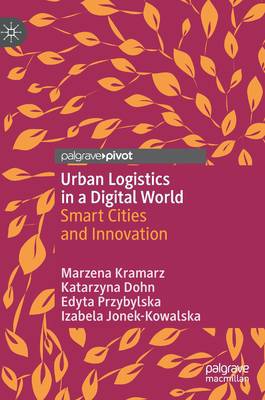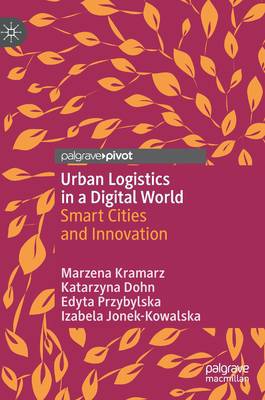
- Afhalen na 1 uur in een winkel met voorraad
- Gratis thuislevering in België vanaf € 30
- Ruim aanbod met 7 miljoen producten
- Afhalen na 1 uur in een winkel met voorraad
- Gratis thuislevering in België vanaf € 30
- Ruim aanbod met 7 miljoen producten
Urban Logistics in a Digital World
Smart Cities and Innovation
Marzena Kramarz, Katarzyna Dohn, Edyta Przybylska, Izabela Jonek-KowalskaOmschrijving
Chapter 1: Smart City - a holistic approach
The aim of the chapter is to present the genesis, development and the most important assumptions of the smart city concept. This chapter will provide an introduction to further considerations and research focused on urban logistics, including in particular goods flows. This chapter describes the evolution of smart cities taking into account their three subsequent generations (1.0; 2.0; 3.0) and in terms of all areas of sustainable development (technical, economic, social and environmental). In the final part, the considerations are narrowed down to the leading aspect of urban logistics and its role in shaping the quality of life of residents. The content of the chapter will be developed on the basis of the literature on the subject and the current, exemplary achievements in shaping the logistics infrastructure in smart cities (case studies).
Chapter 2: Logistic support areas of cities in the context of material flows
The aim of the second chapter is to indicate the areas of the city's logistic support in the area of goods flows in the city's logistics system and the logistics of returns. The authors focused on the flows of goods due to the fact that greater interest of local government units is usually attributed to mobility. The adopted perspective is justified by the current changes in the area of goods flows in cities. Nowadays, they include both supply transport to commercial, service and production points, but also deliveries to individual recipients of consumer goods. Moreover, attention will be paid to the current problems of logistics returns, especially in the aspect of the dynamically developing e-commerce industry. In the area of material flows, the authors treat the problem of waste management in the city as a separate problem, and due to its complexity and multifaceted nature, they will not address this issue in this study. Identification of the areas of logistic support will be made with the use of a systematic review of the literature and pilot studies.
Chapter 3: The concept of logistics maturity of cities
The purpose of the third chapter is to develop a methodology for assessing the logistics maturity of cities. The logistics maturity construct is already being taken up in the literature. In order to assess the maturity of the city, the methodology of logistics maturity assessment should be adapted to the specificity of the research subject, i.e. the city. On the other hand, there are also models for assessing the maturity of a smart city. This methodology differs from the methodology indicated for the assessment of logistics maturity. The challenge undertaken by the authors is to combine knowledge from the area of maturity models, especially logistics maturity and smart city maturity. In line with the literature's current achievements, a reference model for the city's logistics maturity and a road map will be developed.
Chapter 4: Logistics maturity of Polish cities on the way to becoming a smart city
In line with the developed model of logistics maturity of cities, this chapter assesses the degree of maturity of Polish cities. Moreover, city positioning was carried out in terms of the advancement of smart solutions. For this purpose, a survey was conducted in 280 Polish cities. These studies allowed for the classification of these cities to the levels of logistics maturity and the degree of advancement of smart solutions. The next stage is in-depth research on a smaller research sample, the aim of which is to combine logistics solutions in the city with smart solutions in the city. Thus, at this stage, it will be possible to answer the questions: what logistic challenges are generated or reduced by smart urban solutions and to what extent do economic and social factors determine the logistics maturity
Specificaties
Betrokkenen
- Auteur(s):
- Uitgeverij:
Inhoud
- Aantal bladzijden:
- 173
- Taal:
- Engels
Eigenschappen
- Productcode (EAN):
- 9783031128905
- Verschijningsdatum:
- 18/11/2022
- Uitvoering:
- Hardcover
- Formaat:
- Genaaid
- Afmetingen:
- 148 mm x 210 mm
- Gewicht:
- 381 g

Alleen bij Standaard Boekhandel
Beoordelingen
We publiceren alleen reviews die voldoen aan de voorwaarden voor reviews. Bekijk onze voorwaarden voor reviews.











